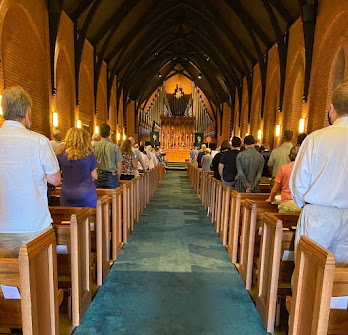Lectionary: Lectionary: Isaiah 65:17-25; Psalm 118:1-2, 14-24; Acts 10:34-43; John 20:1-1
¡Aleluia! Cristo ha resucitado! Alleluia! Christ is risen! (The people respond) The Lord is risen indeed! Alleluia!
Happy Easter, everyone!
Today we have the privilege of bringing another person into the community of love known to the world as Emmanuel Episcopal Church in Webster Groves, MO. The Baptism of Miriam Bruner-Wiltsie is an important event because by it we are made whole in a new way. By incorporating the one, the whole of us is made new.
It is also a big responsibility for us who are her family of faith. God has created Miriam for a purpose. She has been gifted for that purpose, and it is up to us, her community of love, to help her discover those gifts, nurture them, and then use them to further God’s kingdom of love here on earth.
This is no small thing, and it isn’t just about Miriam. The same is true for all of us. We all have a responsibility to discover, nurture, and employ our God-given gifts as partners with God in the co-creation and transformation of the world.
In our gospel story today, Mary Magdalene models that for us. Returning to the tomb where Jesus had been hastily buried before the Passover and finding the stone door of the tomb rolled away, Mary runs back to tell Peter and John. All three then head back to the tomb to see what had happened. The author tells us that Peter went in first, then John. Unable to understand, they simply returned to their homes… but Mary Magdalene stayed at the tomb, weeping.
When she finally summons up the courage to look inside, Mary saw two angels – messengers of God – who asked her why she was weeping. Believing that those who killed Jesus must have stolen his body, Mary Magdalene replies, “I don’t know where Jesus is.”As soon as she said that there he was, though in his resurrected state Mary couldn’t recognize him. Then Jesus spoke her name and her heart melted. “Rabboni!” she breathed.
If it had been me, I’d have run to Jesus and thrown my arms around him in a big hug. Back then, however, women and men who weren’t related didn’t do that.
But Jesus, who knows our hearts, knew Mary’s recognition of him was too small. The resurrection meant that everything, including their relationship, was different and they would all need time to understand how to live into this new reality.
Easter offers us the opportunity to reflect on our recognition of Jesus in our lives. Is it too small? Have we made room in our lives for the transforming reality of our relationship with the resurrected Jesus?
Duncan Gray, III, retired bishop of the Diocese of Mississippi, once said: "Change is doing something differently. Transformation is becoming something more. Transformation begins to take place when we offer ourselves, our souls, our bodies – our dreams, our visions, our plans – to Almighty God. And as we make our offering we say, not, ‘here are our plans, bless them;’ but, rather, ‘here are our lives, use them.’ And…it is in that offering … that [the] weak become strong, the proud become humble, and lives are transformed.”
Let’s go back for a minute to the first part of today’s gospel story where Peter and John witness the empty tomb. They didn’t see any angels and they didn’t see Jesus. They didn’t see, perceive, or understand anything, so they left. Mary stayed, and in the midst of her sadness, fear, and confusion Jesus showed up.
At the end of their encounter, Mary was transformed. She’d become something more – and she ran back to witness resurrection transformation to the others.
When we are drowning in sorrow, or fear, or confusion Jesus will show up. We just need to wait in the discomfort as Mary did.
Redemption is guaranteed for everyone, for as we read in Acts, God shows no partiality. It’s pretty clear that God didn’t pick Peter because he was so astute. Right? Yet look at Peter’s legacy. God created Peter, gifted him, and sent him to live out his purpose; and Peter did that – in all his imperfection.
God chooses each of us too. What is God’s purpose for our lives? The best answer I’ve heard to that question came from my daughter years ago when she was an undergraduate. She had been arguing with some of her childhood friends who were “Christians” about homosexuality. In their efforts to help her avoid eternal damnation as a lesbian, they kept throwing Bible verses at her.
Here was my daughter’s response, and I share it with you because I can’t make a better point on EasterDay than what she said: “All those words [in the Bible, she said] are different ways of illustrating one message: lovelovelovelovelove. God is love. Period. You don't have to understand it. You don't have to agree with it. You can try to collect all the rules you want, and I'm sure that's a comfort. It's just not the point. I will say it until I die: God is love.” ~Jessica ShererI will say it too until I die: God is love. I will also say that we don’t live our lives on earth trying to get to heaven, but as co-creators with God of heaven on earth.
We gather on this Easter Day to be transformed by the power of the truth that God is love. We also get to welcome another Christian into that love. Welcoming Miriam as a sibling in the body of Christ, we commit to be the community of love that forms her so that she is empowered and supported as she fulfills the purpose for which she was created.
(Invitation of Miriam’s family, friends, and their children to the Baptismal font)














